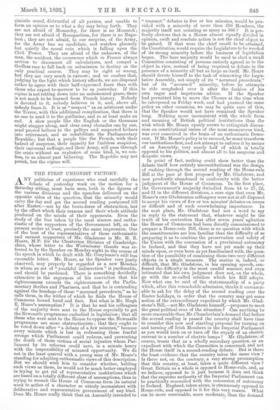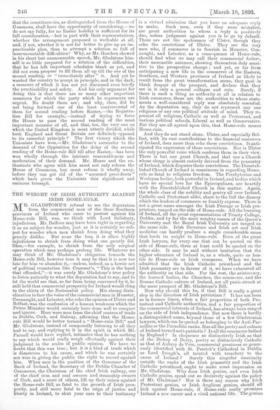THE FIRST UNIONIST VICTORY.
ANY politicianof experience who read carefully the debate of yesterday week on the motion for a Saturday sitting, must have seen, both in the figures of the various divisions and the speeches delivered on the opposite sides of the questiln, that the minority would carry the day and get the second reading postponed till after Easter,—not by the brute-force of obstruction, but by the effect which their reasons and their whole attitude produced on the minds of their opponents. Even the study of the line taken by the most sincere and enthu- siastic of the supporters of the Government left, on the present writer at least, precisely the same impression. One of the best of the representatives of these enthusiastic and earnest supporters of Mr. Gladstone is Mr. H. E. Hoare, M.P. for the Chesterton Division of Cambridge- shire, whose letter to the Westminster Gazette was re- ferred to by the Speaker on Monday night in the course of the speech in which he dealt with Mr. Conybeare's still less excusable letter. Mr. Hoare, as the Speaker very justly observed, may properly be regarded as a new Member in whom an act of "youthful indiscretion" is pardonable, and should be pardoned. There is something decidedly attractive in the eagerness of his conviction that his righteousness exceeds the righteousness of the Parlia- mentary Scribes and Pharisees, and that he is contending against the bondage of those "accursed precedents," as he calls them, in the withes of which he finds the House of Commons bound hand and foot. But what is Mr. Hugh E. Hoare's assumption? It is that he and his colleagues of the majority were sent to the House especially to get the Newcastle programme embodied in legislation; that all those who were sent to the House to oppose the Newcastle programme are mere obstructionists ; that they ought to be voted down after "a debate of a few minutes," because every minute which is lost in redressing those fearful wrongs which Parliament could redress, and preventing the death of those victims of social injustice whom Par- liament by its reforms could 'save, is a minute heavy with the responsibility of misused opportunity. We do not in the least quarrel with a young man of Mr. Hoare's standing for adopting enthusiastic views of this description. But we should wish him to consider whether, holding such views as these, he would not be much better employed in trying to get rid of representative institutions which are based on a totally different class of assumptions, than in trying to wrench the House of Commons from its natural work to action of a character so utterly inconsistent with deliberative and representative government of any kind. Does Mr. Hoare really think that an Assembly intended to "transact" debates in five or ten minutes, would be pro- vided with a minority of more than 310 Members, the majority itself not counting so many as 360? It is per- fectly obvious that in a House almost equally divided in opinion, swift and resolute action is not the chief object to be gained. If that were the chief result to be attained, the Constitution would require the Legislature to be weeded of its strong minority before the business of legislation began. The bare majority would be used to elect a small Committee consisting of persons entirely agreed as to the object in view, instead of being required to debate in the presence of a minority all but as large as itself. Mr. Hoare should devote himself to the task of winnowing the Legis- lative Assembly, not simply of its "accursed precedents," but of its " accursed " minority, before he attempts to ride roughshod. over it after the fashion of his own eager and impetuous advice. If the Speaker had permitted him to move the Closure at the time when he interposed on Friday week, and had pursued the same policy on other occasions, we may be quite sure of this, that the Speaker would not have remained the Speaker long. Nothing more inconsistent with the whole form and meaning of British political institutions than the wish which Mr. Hoare openly avows to extinguish discus- sion on constitutional issues of the most momentous kind, was ever conceived in the brain of an enthusiastic Demo- crat. If Mr. Hoare's policy is to succeed, he must transform our institutions first, and not attempt to enforce it by means of an Assembly, very nearly half of which is totally opposed to his politics, and almost all to his sanguine and despotic views. In point of fact, nothing could show better than the debate itself how entirely unconstitutional was the design of rushing through the second reading of the Home-rule Bill at the pace at first proposed by Mr. Gladstone, and. now prudently abandoned in conformity with the better judgment of the House of Commons. In the first place, the Government's majority dwindled from 44 to 27, 22, and 21 in the different divisions, a sure sign that even Mr. Hoare's own Gladstonian colleagues were not at all disposed to accept his views of five or ten minutes' debates on issues I so difficult and of such overwhelming importance. In the next place, Mr. Gladstone had not a word to say in reply to the statement that, whatever might be the truth of his contention that after seven years' agitation the House of Commons had been directly commissioned to prepare a Home-rule Bill, there is no question with which the constituencies are less familiar than the difficulty of so preparing it as to combine the preservation and safety of the Union with the concession of a provisional autonomy to Ireland, and that they have not yet made up their minds upon, or even been as yet familiarised with, the ques- tion of the possibility of combining these two very different objects in a single measure. The matter is, indeed, so difficult, that Mr. Gladstone, in his opening speech, con- fessed the difficulty in the most candid manner, and even intimated that his own judgment does not, on the whole, go with the so-called solution which his Bill adopts. Now what can be said of the statesmanship of a party which, after this remarkable admission, thinks it unreason- able to ask for the delay of the second reading over the Easter holidays, in order that the country may get some notion of the extraordinary expedient by which Mr. Glad- stone's Bill,—not Mr. Gladstone himself,—proposes to meet the great political crux of the situation ? Can anything be more reasonable than Mr. Chamberlain's demand that before the second reading is passed the country shall have time to consider this new and startling proposal for turning on and turning off Irish Members in the Imperial Parliament as you would turn on or turn off the supply of an electric current to a number of electric lamps ? Mr. Gladstone, of course, treats that as a wholly secondary question, as an expedient with which the Committee is concerned, and not i the House itself in a second-reading debate. But s there the least evidence that the country takes the same view. ? Is there not, on the contrary, a very strong presumption that this country, at least, takes a quite different view ? Great Britain as a whole is opposed to Home-rule, and, as we believe, opposed to it just because it does not think that the supreme authority of the Imperial Parliament can be practically reconciled with the .concession of autonomy to Ireland. England, taken alone, is strenuously opposed to i Home-rule, and opposed to t for this very reason. What can be more reasonable, more moderate, than the demand that the constituencies, as distinguished from the House of Gunmons, shall have the opportunity of considering,—we do not say fully, for no Easter holiday is sufficient for its full consideration,—but in part with their representatives, whether the arrangement proposed is workable at all, and, if not, whether it is not far better to give up an im- practicable plan, than to attempt a solution so full of insurmountable difficulties? Why, as Mr. Goschen showed in his short but unanswerable speech, Mr. Gladstone him- self is so little prepared for a solution of the difficulties, that he has left important schedules blank as yet, and did not even propose to fill them all up till the eve of the second reading, or "immediately alter" it. And yet he wanted the country to accept in principle, and in the dark, a measure of which it has not yet discussed even briefly the practicability and safety. And his only argument for doing this is that there are so many other important measures for which the party which he represents are urgent. No doubt there are ; and why, then, did he not bring forward one of the least controversial of them for second reading before Easter,—the Registra- tion Bill for example,—instead of trying to force the House to pass the second reading of the most important measure of all, and that, too, the very one on which the United Kingdom is most utterly divided, while both England and Great Britain are definitely opposed to its essential principle ? The first victory which the Unionists have won,—Mr. Gladstone's surrender to the demand of the Opposition for the delay of the second reading•of the Home-rule Bill till after Easter,—has been won wholly through the intrinsic reasonableness and moderation of their demand. Mr. Hoare and the en- thusiasts who agree with him must not only reform the House of Commons, but must reform it wholly away, before they can get rid of the "accursed precedents" which have given the Unionists this significant and ominous triumph.



































 Previous page
Previous page